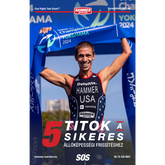Why is it important for an athlete to take vitamins every day?
For athletes, proper nutrition and nutrient intake are crucial for maintaining high-level sports performance, aiding recovery, and preserving health. Vitamins, as micronutrients, are essential for athletes because they play a key role in the body's functions, helping maximize training effectiveness, prevent injuries, and maintain overall well-being. Since athletes have unique physiological and energy requirements, daily vitamin intake can help their bodies function optimally and minimize the negative effects caused by overtraining or nutritional deficiencies.
-
The Role of Vitamins in an Athlete's Diet
Vitamins are essential for our bodies because we cannot produce them ourselves, so they must be obtained from external sources. For athletes, it is especially important to receive adequate amounts of these micronutrients daily. Vitamins participate in numerous biochemical reactions, including regulating cell metabolism, producing energy, supporting immune responses, and aiding tissue regeneration.
Although optimal vitamin intake can be ensured through a well-balanced diet, athletes often find that due to their high energy and micronutrient needs, food alone may not fully meet their requirements. Moreover, the increased physical strain, frequent training, competitions, and physical stress that athletes undergo can raise their vitamin needs, necessitating daily supplementation.
-
Vitamins and Sports Performance
Vitamins affect sports performance in various ways, supporting energy supply, muscle function, and recovery.
- Vitamin C: Vitamin C is a powerful antioxidant, which is especially important for athletes, as regular exercise and intense physical activity increase oxidative stress in the body. Vitamin C can help reduce this stress and prevent tissue damage, including muscles and joints. It also plays a fundamental role in collagen synthesis, which supports the elasticity and regeneration of skin, joints, and tendons. Thus, vitamin C contributes to faster healing and injury prevention (Hoffman et al., 2009).
- B Vitamins: B vitamins, especially B6, B9 (folate), and B12, are essential for converting nutrients into energy. They assist in the metabolism of carbohydrates, fats, and proteins, directly influencing an athlete's energy levels. B vitamins also play a role in red blood cell production, thus enhancing oxygen delivery throughout the body, which is vital for sustained physical activity. Optimal B-vitamin levels also support post-training recovery (Maughan et al., 2018).
- Vitamin D: Vitamin D is crucial for maintaining bone health, as it promotes the absorption of calcium and phosphorus in the gut. Athletes are often prone to vitamin D deficiency, especially during winter months when sunlight exposure decreases, and they spend less time outdoors. Vitamin D reduces the risk of bone fractures and enhances bone mineralization, which is particularly important due to the physical strain athletes face. It may also support muscle function and reduce injury risk (Gano-Overway et al., 2019).
-
Supporting the Immune System with Vitamins
Athletes are often prone to colds and other illnesses because intense training and prolonged physical activity can weaken the immune system. Vitamins, particularly C and E vitamins, play a key role in immune function and protect cells from free radicals generated during oxidative stress.
- Vitamin C: As an antioxidant, vitamin C supports the function of white blood cells, which fight infections. Regular exercise can weaken the immune system, but vitamin C helps maintain a proper immune response. Additionally, it assists in the absorption of iron, which increases the oxygen-carrying capacity of red blood cells (Neufer et al., 2015).
- Vitamin E: Vitamin E is another important antioxidant that protects cells from free radicals produced during high-intensity exercise. Vitamin E thus not only enhances antioxidant protection but can also contribute to cellular regeneration and minimize muscle damage.
-
Vitamins and Injury Prevention
Vitamins can help prevent injuries and accelerate rehabilitation. Athletes are often exposed to the risk of injury due to overtraining, repetitive exercises, and high-intensity physical activity. Vitamins—such as A, C, and E—contribute to the production of collagen and elastic fibers, which are essential for the flexibility of joints, tendons, and ligaments.
- Vitamin A: Vitamin A plays a critical role in tissue regeneration, including the repair of joints, muscles, and ligaments. It also supports the regeneration of skin and mucous membranes, helping speed up recovery.
- Vitamin D: Vitamin D is essential for bone health, and its deficiency increases the risk of fractures. For athletes subjected to high physical stress, maintaining adequate vitamin D levels can reduce the risk of bone fractures and support faster rehabilitation following injuries (Arun et al., 2011).
-
When Daily Vitamin Supplementation is Especially Important
- Intense Training or Competition Season: Due to increased physical strain, athletes may need higher amounts of vitamins as exercise boosts oxidative stress and increases nutrient demands.
- Unilateral or Strict Diets: Some athletes follow restricted diets, such as vegan, vegetarian, or low-calorie plans, which may make it more difficult to ensure adequate vitamin intake.
- Post-Injury Recovery: Vitamins, particularly C and D vitamins, can support faster recovery from injuries by promoting tissue regeneration and protecting bones and joints.
To ensure optimal vitamin intake, athletes should not only carefully plan their diet but also monitor the levels of specific vitamins, such as vitamin D, B vitamins, C, and E, as these nutrients play critical roles in maintaining performance and health.
-
Recommended Daily Vitamin Intake and Sources
Since vitamins are widely available in foods, the best way to achieve proper vitamin levels is by following a healthy, varied diet. However, if the diet does not provide sufficient vitamins, supplementation can help maintain optimal nutrient levels.
- Vitamin C: The recommended daily intake is generally 75-90 mg for adults. Sources: citrus fruits, red peppers, broccoli, berries.
- B Vitamins: Daily needs vary (e.g., B6: 1.3-2 mg, B12: 2.4 µg), and the best sources include meat, eggs, dairy products, whole grains, and legumes.
- Vitamin D: The daily requirement is 600-800 IU for adults, especially in winter when sunlight is limited. Sources: fatty fish (salmon, mackerel), eggs, vitamin D-fortified foods.
- Vitamin E: The recommended daily intake is 15 mg, and the best sources include oils (e.g., sunflower oil, wheat germ oil), nuts, seeds, and leafy green vegetables.
-
Risks of Vitamins and Excessive Intake
While vitamins are essential for health, excessive intake can be harmful, particularly for fat-soluble vitamins (A, D, E, K), which can accumulate in the body and cause toxic effects. For water-soluble vitamins (such as C and B vitamins), excess amounts are typically excreted in urine, but excessive intake is still not recommended. Therefore, before taking vitamin supplements, it is important to consult a nutritionist or doctor to avoid overdosing.
Summary: Why is Daily Vitamin Intake Important for Athletes?
In conclusion, vitamins are indispensable for athletes to ensure optimal performance, minimize injury risk, and promote faster recovery. Adequate vitamin intake contributes to a healthy immune system, tissue repair, and supports a long-term injury-free athletic career. Daily supplementation helps athletes’ bodies adapt to increased physical demands and protects them from various health issues related to an athletic lifestyle.
References:
- Hoffman, J. R., et al. (2009). "Effects of Vitamin C Supplementation on Exercise-Induced Oxidative Stress." Journal of Strength and Conditioning Research, 23(1), 174-179.
- Maughan, R. J., et al. (2018). "Dietary supplements in sport and exercise." Journal of Sports Sciences, 36(7), 761-772.
- Gano-Overway, L., et al. (2019). "The role of vitamin D in athlete health." Journal of Sports Medicine and Physical Fitness, 59(2), 247-254.
- Neufer, P. D., et al. (2015). "Antioxidant supplementation and its effects on exercise-induced oxidative stress and muscle function." Journal of Applied Physiology, 118(4), 493-503.
- Arun, K., et al. (2011). "Vitamin D and bone health in athletes: A review." Journal of Athletic Training, 46(5), 497-504.











